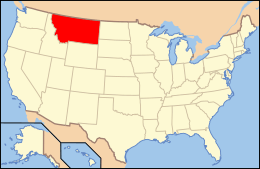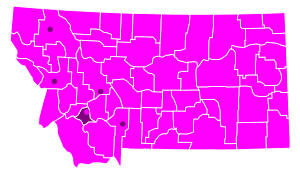LGBT rights in Montana
| LGBT rights in Montana | |
|---|---|
 | |
| Same-sex sexual intercourse legal status |
Legal since 1997 (Gryczan v. State) |
| Gender identity/expression | Altering sex on birth certificate does not require sex reassignment surgery |
| Discrimination protections |
Sexual orientation and gender identity protected in state employment; Gender identity under Schwenk v. Hartford |
| Family rights | |
| Recognition of relationships | Same-sex marriage since 2014 |
| Adoption | Same-sex couples allowed to adopt |
Lesbian, gay, bisexual, and transgender (LGBT) persons in the U.S. state of Montana may face some legal challenges not experienced by non-LGBT residents. Same-sex sexual activity is legal in Montana. Same-sex couples and families headed by same-sex couples are eligible for all of the protections available to opposite-sex married couples, as same-sex marriage has been legal since November 2014. However, discrimination on the basis of sexual orientation is not banned statewide. A ruling of the Ninth Circuit Court of Appeals has made gender identity-based discrimination illegal in the state under federal law.
Legality of same-sex sexual activity
Montana revised its Criminal Code in 1973 and retained its anti-sodomy statute. An attempt to repeal the state's sodomy law failed in 1991. The Montana Supreme Court held in Gryczan v. State (1997) that the state law prohibiting same-sex sexual contact between consenting adults was unconstitutional.[1]
An attempt to repeal the statute failed in 2011.[2]
On February 20, 2013, the Montana State Senate passed a bill, by a vote of 38 to 11 vote, that repealed part of the sodomy statute dealing with consenting adults. On April 10, 2013, the Montana House of Representatives passed the bill by a vote of 64 to 35 votes. On April 18, 2013, Governor Steve Bullock signed the legislation into law.[3][4]
Recognition of same-sex relationships
Marriage
A federal court ruled the state's ban on same-sex marriage unconstitutional on November 19, 2014. Judge Brian Morris issued an injunction against the state's enforcement of its ban that took effect immediately. The state's appeal to the Ninth Circuit Court of Appeals was mooted when the U.S. Supreme Court ruled on June 26, 2015 that Ohio's ban on same-sex marriage is unconstitutional, striking down every remaining state ban.[5]
Montana voters had adopted a constitutional amendment in November 2004 that defines marriage as the union of a man and a woman.[6] Similar restrictions appear in the state statutes.[7]
Adoption and parenting
Montana permits adoption by individuals. There are no explicit prohibitions on adoption by same-sex couples or on second-parent adoption by a person of the same sex as the first parent. In Kulstad v. Maniaci, Barbara Maniaci refused to allow Michelle Kulstad to see the children they had raised together and who had legally been adopted only by Maniaci, but the trial court sided with Kulstad and granted her parental rights. The Montana Supreme Court affirmed this ruling 6-1 on October 7, 2009, setting precedent allowing for future step-parent adoptions by same-sex couples statewide.[8][9]
Discrimination protections

Montana, by executive order, prohibits discrimination on the bias of sexual orientation and gender identity in state employment and state (sub)contractors. In 2000, Governor Marc Racicot first issued state personnel rules prohibiting discrimination and harassment on the basis of sexual orientation with respect to employment by state government.[10] In November 2008, Governor Brian Schweitzer issued Executive Order No. 41-2008, broadening state government's non-discrimination provisions.[11] In January 2016, Governor Steve Bullock expanded the protections to cover gender identity and expanded it to state contractors and subcontractors.[12]
On February 23, 2011, the Montana House of Representatives passed, by a 62-37 vote, a bill that would have prohibited local municipalities from adopting anti-discrimination policies not protected in the state law. On April 28, 2011, the bill died in the Montana State Senate's Standing Committee.[13]
The following Montana municipalities have ordinances prohibiting discrimination on the basis of sexual orientation and gender identity in both the public and private sector: Bozeman,[14] Butte,[15] Helena,[16] Missoula,[17] and Whitefish.[18]
Missoula County prohibits discrimination against county employees only.[19]
Schwenk v. Hartford
On February 29, 2000, citing Title VII case law, the United States Court of Appeals for the Ninth Circuit, which covers Alaska, Arizona, California, Idaho, Guam, Hawaii, Montana, Nevada, the Northern Mariana Islands, Oregon and Washington, ruled in favor of a transgender woman's claim of sex discrimination under the Gender Motivated Violence Act based on the perception that she was a man who failed to act like one. The Court noted that "the initial approach" taken in earlier federal appellate Title VII cases, which had dismissed gender identity discrimination, "has been overruled by the language and logic of Price Waterhouse."[20][21] This made gender identity discrimination illegal in Montana, despite it not being explicitly banned under state law.
Hate crime law
Montana's hate crime statute does not cover hate crimes based on sexual orientation or gender identity.[22] These two categories are covered by federal law, however.
Gender identity and expression
Transgender people may change their gender marker on their official documents in Montana. Previously, they could only do this following sex reassignment surgery and clinical treatment. However, changes in December 2017 removed these requirements. Since then, transgender individuals may change their legal gender simply after sending an affidavit to the state.[23]
In June 2018, it was revealed that a conservative initiative to require transgender people to use public bathrooms corresponding with their birth sex had failed to collect the necessary signature to appear on the ballot.[24]
Public opinion
A 2017 Public Religion Research Institute (PRRI) opinion poll found that 57% of Montana residents supported same-sex marriage, while 37% opposed it and 6% were unsure. Additionally, 61% supported an anti-discrimination law covering sexual orientation and gender identity. 33% were opposed.[25]
References
- ↑ Jason Pierceson, Courts, Liberalism, and Rights: Gay Law and Politics in the United States and Canada (Temple University Press, 2005), 83-5, available online, accessed April 14, 2011
- ↑ Billings Gazette: Charles S. Johnson, "Montana House refuses to blast gay sex ban bill out of committee," March 29, 2011, accessed April 14, 2011
- ↑ "SB 107". Laws.leg.mt.gov. Retrieved 2014-06-29.
- ↑ "Montana axes obsolete sodomy law". San Diego Gay & Lesbian News. April 19, 2013. Retrieved May 18, 2013.
- ↑ Johnson, Chris (November 19, 2014). "Judge strikes down Montana ban on same-sex marriage". Washington Blade. Retrieved November 19, 2014.
- ↑ CNN: 2004 Ballot Measures, accessed April 14, 2011
- ↑ Human Resources Campaign: Montana Marriage/Relationship Recognition Law Archived 2011-05-24 at the Wayback Machine., accessed April 14, 2011
- ↑ http://missoulian.com/news/local/article_ea416fee-b2dd-11de-8154-001cc4c002e0.html
- ↑ Human Resources Campaign: Montana Adoption Law Archived 2012-02-18 at the Wayback Machine., accessed April 14, 2011
- ↑ Montana – Sexual Orientation and Gender Identity Law and Documentation of Discrimination
- ↑ Executive Order No. 41-2008
- ↑ Montana Governor Steve Bullock Signs Executive Order Protecting LGBT State Employees
- ↑ "MT HB516 | 2011 | Regular Session". Legiscan.com. Retrieved 2014-06-29.
- ↑ "Bozeman, Mont., adopts LGBT-inclusive non-discrimination ordinance". LGBTQ Nation. June 3, 2014.
- ↑ Smith, Mike (February 20, 2014). "Butte-Silver Bow commissioners OK anti-discrimination law". Missoulian. Retrieved February 20, 2014.
- ↑ Talwani, Sanjay (December 18, 2012). "Nondiscrimination ordinance passes unanimously in Helena". Billings Gazette. Retrieved December 18, 2012.
- ↑ Missoulian: Keila Szpaler, "Missoula City Council makes history in adopting non-discrimination law," April 14, 2010, accessed April 14, 2011
- ↑ "Whitefish council unanimously passes nondiscrimination ordinance". NBC Montana. April 6, 2016.
- ↑ "Human Resources - Job Listings". Missoula County.
Missoula County will not refuse employment or discriminate in compensation, benefits, or the other terms, conditions and privileges of employment based upon: [...] sexual orientation, gender identity, or expression
- ↑ SCHWENK v. HARTFORD
- ↑ EEOC's Inclusion of Sexual Orientation and Gender Identity Under Title VII's Prohibition of Sex Discrimination and Possible Implications for Private Employers
- ↑ Human Resources Campaign: Montana Hate Crimes Law Archived 2012-03-11 at the Wayback Machine., accessed April 14, 2011
- ↑ Montana, National Center for Transgender Equality
- ↑ Montana Joins the List of States that Have Rejected Anti-Trans Discrimination
- ↑ PRRI: American Values Atlas 2017